A blog post about how to reverse engineer a VxWorks based device.
Introduction
Embedded devices are a huge and wide world of options for CPU architectures, operating systems and file systems. You can find the combination you can think of. In this case, I'll present a study about the TP-Link TL-WR543G. This old router I had at home came equipped with a MIPS CPU and VxWorks as its OS.
In this blog post, I'll show you my adventures with the reverse engineering process of this VXWorks based device. I'm going to explain my findings and all my fails when dealing with the firmware and binary analysis, which are the main reasons I'm writing this down.
VxWorks little overview
As said previously, the WR543G router runs VxWorks. VxWorks is a proprietary RTOS developed by Wind River Systems. It supports many architectures like Intel, Power-PC, ARM, MIPS, etc. It has its own development suite called Wind River Workbench that includes an editor, compiler toolchain, debugger, and emulator.
VxWorks is used by products across a wide range of market areas: aerospace and defense, automotive, industrial such as robots, consumer electronics, medical area and networking.
As VXWorks is a proprietary OS, it has many vendor specific attributes, this includes the security model. For example, Stack Overflow Detection for user programs. The firmware structure and file system are also vendor specific.
If you are, like me, used to reverse other kinds of devices that usually include Unix-like OSes, you'll find that VxWorks requires a little more work in order to obtain the Grail.
If you want to read more about VxWorks, you can refer to the VxWorks related work section at the end of this article.
How things happened
This wasn't the first time I looked into this router. Some time ago, I tried to reverse the firmware but I didn't make much progress on that path. So, I decided to open the case and see what was inside. The hardware approach also conducted me to a dead end as I didn't want to unsolder anything at that time. So I put it aside for a while until now. I wanted to understand how the firmware was built and what could be extracted from it in order to do a deeper analysis. There isn't too much information available about VxWorks internals, just a few posts from devttys0 and some others in Chinese language. However, those were enough for me to have a very good progress with the reversing process. So, after a short introduction about the hardware analysis, I'll focus more on the firmware analysis.
Hardware analysis
Description
CPU: Atheros AR2317-AC1A (all integrated, WiFi, MIPS 4000)
Flash: Z-16PGJI-016S338-S9178PC7 (2MB?)
SDRAM: EM639165TS-6G, 16 MB
Ethernet: Marvell 88E6060-RCJ1
UART: Yes
Regarding the flash memory, the previous version (WR542G) was 2 MB in size. I couldn't find too much info with the serial number so I suppose the size of the flash is similar in this case.
The following are some pictures from the main board.
Front

Back

CPU, RAM, Flash

Serial port
When looking at the main board, you can see that there's a pinout similar to UART (Universal asynchronous receiver-transmitter). I followed the methodology mentioned in this devttys0's blog post in order to reverse engineer the pins. You can see them in the following picture:
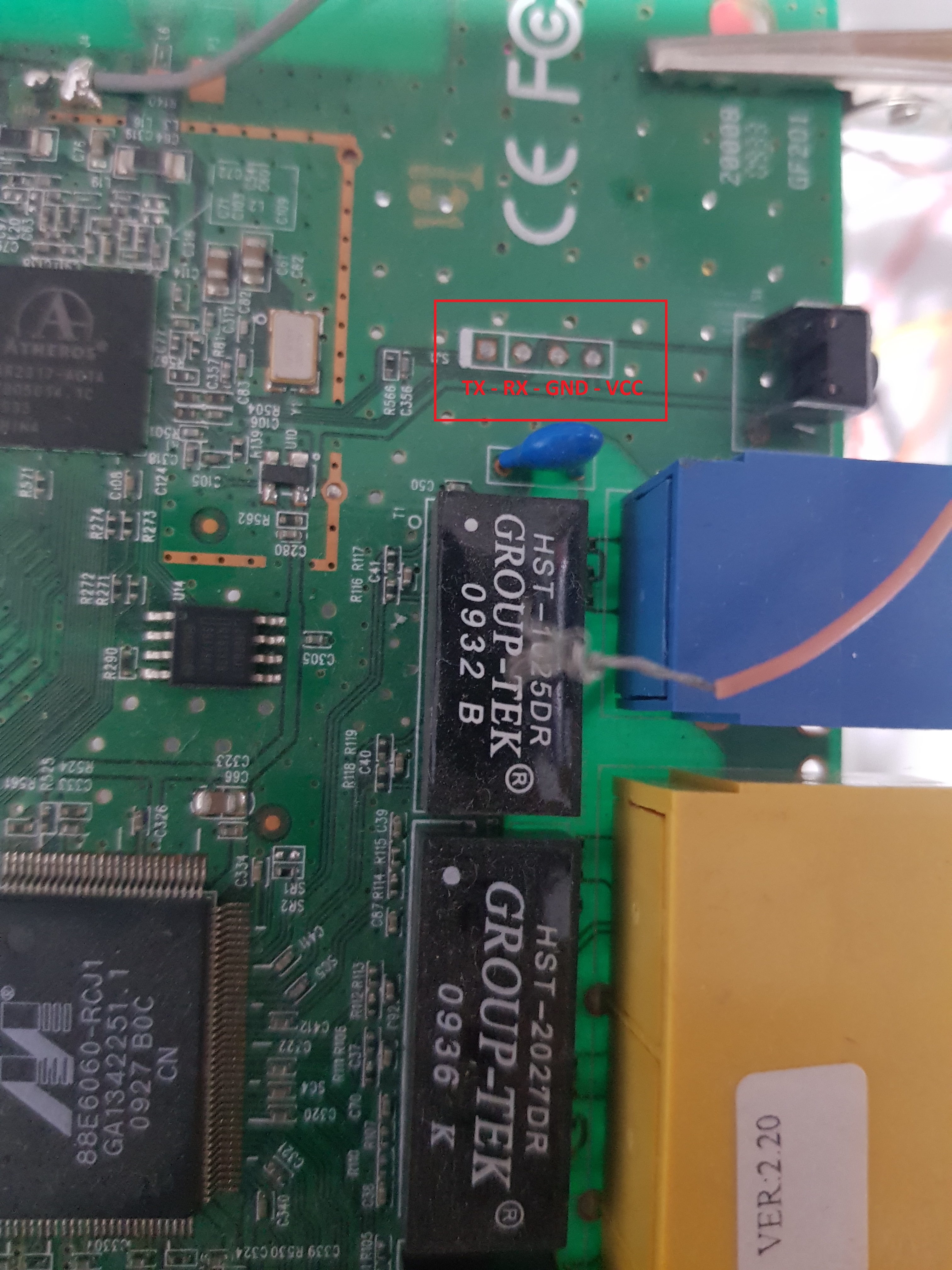
These are the UART parameters: COM3 (in my case, check yours), Baudrate: 38400
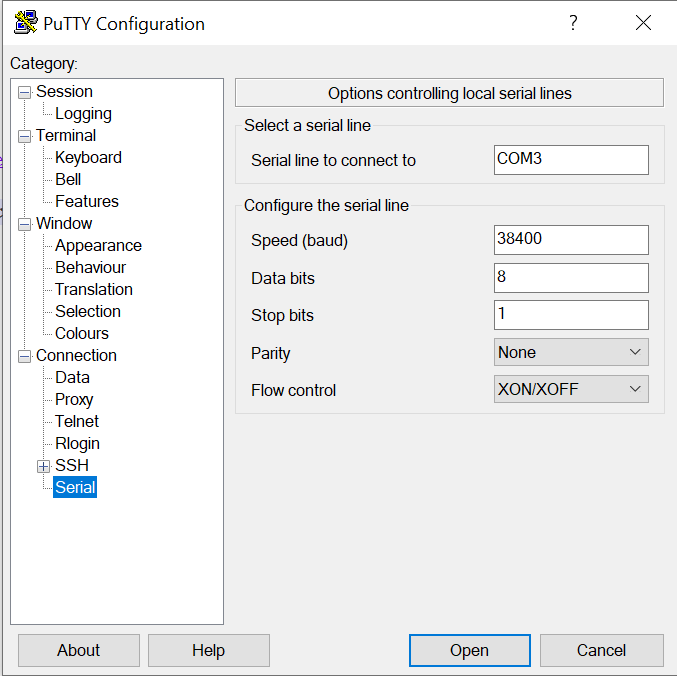
Once I set the UART interface up, I was able to access the boot log and boot menu:
AR2315 rev 0x00000090 startup...
Attached TCP/IP interface to ae unit 0
Attaching interface lo0...done
USRCONF : g_size = 18112
Name = MODULE_USR_CONF_T , size = 12
Name = UC_IEEE802_1X_CFG_DATA_T , size = 512
Name = UC_ADVANCED_CFG_T , size = 16
Name = UC_ARP_CFG_T , size = 32
Name = UC_BPA_CFG_DATA_T , size = 912
Name = UC_DDNS_T , size = 1480
Name = UC_DHCPC_CFG_DATA_T , size = 416
Name = UC_DHCPS_CFG_AND_STATIC_T , size = 708
Name = UC_FIRE_WALL_STATE_T , size = 1992
Name = UC_FORWARD_VIRTUAL_SERVE_CLASS_T , size = 1572
Name = UC_IFQOS_ROUTER_CONF_FLASH_T , size = 120
Name = UC_LAN_CFG_DATA_T , size = 8
Name = UC_L2TP_CFG_DATA_T , size = 1472
Name = UC_MAC_CONFIG_T , size = 80
Name = UC_PPPOE_CFG_DATA_T , size = 1568
Name = UC_NTP_PREFER_SRV_CFG_DATA_T , size = 28
Name = UC_STATIC_IP_CFG_DATA_T , size = 144
Name = UC_SATTIC_ROUTE_CFG_DATA_T , size = 328
Name = UC_MANAGE_USERS_T , size = 64
Name = UC_UTILITIES_T , size = 16
Name = UC_WANCONNTYPE_T , size = 16
Name = UC_WLAN_CFG_T , size = 5020
Name = UC_PPTP_CFG_DATA_T , size = 1472
Name = UC_NETWORK_PSEUDO_T , size = 4
Name = UC_IFQOS_ROUTER_CONF_FLASH_T , size = 120
Port QoS..................
qos_IFInit..................
qos_IFLoadFromFlash..................
wireless access point starting...
wlan0 Ready
entering tddp...
Software Platform for ARM
Copyright(C) 2001-2004 by TP-LINK TECHNOLOGIES CO., LTD.
Creation date: Sep 4 2008, 17:18:51
Press CTRL-B to enter bootmenu...
Boot Menu:
1: Download application program
2: Modify Bootrom password
3: Exit the menu
4: Reboot
5: User commond line
One interesting thing is that the boot log refers to AR2315 instead of AR2317. The AR2315 is a MIPS 4KE 32-bit with 183 MHz processor.
Another important thing to mention is that the boot menu doesn't work at all. If you press any of the reported commands, nothing happens (Btw, I'm using an English keyboard, if you ask). However, when trying other keys, we obtain the following results:
n: netstat
Boot Menu:
1: Download application program
2: Modify Bootrom password
3: Exit the menu
4: Reboot
5: User commond line
Enter your choice(1-4):n
413
Active Internet connections (including servers)
PCB Proto Recv-Q Send-Q Local Address Foreign Address (state)
-------- ----- ------ ------ ------------------ ------------------ -------
80fb7f08 TCP 0 0 0.0.0.0.80 0.0.0.0.0 LISTEN
80fb8538 UDP 0 0 0.0.0.0.2050 0.0.0.0.0
80fb84b4 UDP 0 0 0.0.0.0.53 0.0.0.0.0
80fb8430 UDP 0 0 0.0.0.0.67 0.0.0.0.0
80fb83ac UDP 0 0 0.0.0.0.68 0.0.0.0.0
It seems an HTTP server is running. This is the report from nmap:
Nmap scan report for 192.168.1.1 Host is up (0.0044s latency). Not shown: 98 filtered ports PORT STATE SERVICE 80/tcp open http 1900/tcp closed upnp MAC Address: 00:27:19:C1:76:52 (Tp-link Technologies)
i: ifconfig
Boot Menu:
1: Download application program
2: Modify Bootrom password
3: Exit the menu
4: Reboot
5: User commond line
Enter your choice(1-4):i
ae (unit number 0):
Flags: (0x8b63) UP BROADCAST MULTICAST PROMISCUOUS ARP RUNNING
Type: ETHERNET_CSMACD
Internet address: 192.168.1.1
Broadcast address: 192.168.1.255
Netmask 0xffffff00 Subnetmask 0xffffff00
Ethernet address is 00:27:19:c1:76:52
Metric is 0
Maximum Transfer Unit size is 1500
0 octets received
126 octets sent
0 packets received
3 packets sent
0 non-unicast packets received
0 non-unicast packets sent
0 unicast packets received
3 unicast packets sent
0 input discards
0 input unknown protocols
0 input errors
0 output errors
0 collisions; 0 dropped
lo (unit number 0):
Flags: (0x8069) UP LOOPBACK MULTICAST ARP RUNNING
Type: SOFTWARE_LOOPBACK
Internet address: 127.0.0.1
Netmask 0xff000000 Subnetmask 0xff000000
Metric is 0
Maximum Transfer Unit size is 32768
1 packets received; 1 packets sent
0 multicast packets received
0 multicast packets sent
0 input errors; 0 output errors
0 collisions; 0 dropped
ae (unit number 1):
Flags: (0x8b63) UP BROADCAST MULTICAST PROMISCUOUS ARP RUNNING
Type: ETHERNET_CSMACD
Internet address: 10.1.177.242
Broadcast address: 10.1.177.243
Netmask 0xff000000 Subnetmask 0xfffffffc
Ethernet address is 00:1b:fc:0e:b1:f2
Metric is 0
Maximum Transfer Unit size is 1500
13696 octets received
27868 octets sent
31 packets received
63 packets sent
0 non-unicast packets received
31 non-unicast packets sent
31 unicast packets received
32 unicast packets sent
0 input discards
0 input unknown protocols
0 input errors
0 output errors
0 collisions; 0 dropped
ppp (unit number 1):
Flags: (0xb0) DOWN POINT-TO-POINT
Type: PPP
Metric is 0
Maximum Transfer Unit size is 1400
0 octets received
0 octets sent
0 packets received
0 packets sent
0 non-unicast packets received
0 non-unicast packets sent
0 unicast packets received
0 unicast packets sent
0 input discards
0 input unknown protocols
0 input errors
0 output errors
m: meminfo
Boot Menu:
1: Download application program
2: Modify Bootrom password
3: Exit the menu
4: Reboot
5: User commond line
Enter your choice(1-4):m
501
FREE LIST:
num addr size
---- ---------- ----------
1 0x80b693d0 64
2 0x80ffb1f0 13056
3 0x80ff6770 96
4 0x80b66b60 976
5 0x8038df30 8062064
6 0x80f9fb80 240
SUMMARY:
status bytes blocks avg block max block
------ ---------- --------- ---------- ----------
current
free 8076496 6 1346082 8062064
alloc 4973520 1459 3408 -
cumulative
alloc 4992304 1523 3277 -
k: process list
Boot Menu:
1: Download application program
2: Modify Bootrom password
3: Exit the menu
4: Reboot
5: User commond line
Enter your choice(1-4):k
NAME ENTRY TID PRI STATUS PC SP ERRNO DELAY
---------- ------------ -------- --- ---------- -------- -------- ------- -----
--tExcTask 801c19c4 80ff5380 0 PEND 801e3c50 80ff5260 0 0
-tLogTask 801c6c54 80ff27f0 0 PEND 801e3c50 80ff26d8 --- ---------- --------- --------- ----------
current
free 8076496 6 346082 8062064 alloc 4973520 1459 3408 -
cumulative
alloc 4992304 1523 377 -
0 0
bootromTask8005ad30 80b65be0 8 READY 801dc998 80b64e40 3d0002 0
tWlanCal 800ef730 80be2ba0 10 PEND 801e3c50 80be2ab0 0 0
tApCserv 800de55c 80b6c8f0 10 PEND 801e3c50 80b6c800 0 0
Detectd 80022638 80b631d0 40 DELAY 801db708 80b63148 0 48
timerManage8006d7f0 80d44780 48 PEND+T 80158414 80d44708 3d0004 2
endRecvTask8005bce4 80b85020 49 PEND+T 801e3c50 80b84f10 3d0004 1
tNetTask 8019aab4 80fa4c90 50 PEND 80158414 80fa4c00 0 0
tApHouseKee800de9d0 80b74db0 50 DELAY 801db708 80b74d00 0 1533
dot1xTask 800f3a3c 80b6fd20 50 PEND+T 80158414 80b6fa90 3d0002 6
dhcpcState 800b4438 80de18d0 56 PEND 80158414 80de1830 0 0
dhcpcRead 800b4e10 80de02d0 56 PEND 80158414 80de00b8 3d0002 0
swDhcpcd 80062620 80dde870 56 PEND 801e3c50 80dde618 0 0
802_1X 80093c40 80b680e0 150 PEND+T 80158414 80b68060 3d0004 26
swL2tpd 80069944 80df8d80 198 PEND+T 801e3c50 80df8b08 3d0004 51
swPptpd 8006b4c4 80df2130 198 PEND+T 801e3c50 80df1eb8 3d0004 50
swPppoed 8006863c 80dfd670 199 PEND+T 801e3c50 80dfd3b0 3d0004 48
pppoed_0 8006fbd8 80dff8e0 200 PEND+T 801e3c50 80dff7c8 3d0004 17
pptpProc_0 8007aeac 80df43a0 200 PEND+T 801e3c50 80df4070 3d0004 1
l2tpd_0 80075bd4 80dfaff0 201 PEND+T 801e3c50 80dfaed8 3d0004 15
pptpd_0 800785f0 80df6610 201 PEND+T 801e3c50 80df64f0 3d0004 13
usrRebootd 80066648 80d452b0 202 PEND+T 801e3c50 80d451d0 3d0004 42
mud0_80 8002dd40 80f0ebf0 203 PEND+T 80158414 80f0e9b0 3d0002 581
tFWCONF 8008fbd8 80ddc960 203 DELAY 801db708 80ddc8d8 0 279
dnsProxyd 800c0728 80d475e0 204 PEND+T 80158414 80d473e0 3d0002 38
sntpd 800bf518 80d48e80 205 PEND+T 801e3c50 80d48d48 3d0004 37
sysExLogd 800201b0 80f388a0 240 PEND 80158414 80f38488 3d0002 0
dynTask 800c35fc 80d424d0 250 DELAY 801db708 80d42428 0 35
BPAd_0 800cb6e0 80decc80 253 DELAY 801db708 80decb48 0 33
dhcpsd 800a7688 80d4b3a0 254 PEND+T 80158414 80d4b178 3d0002 32
BPAm_0 800ce5c0 80dea210 255 DELAY 801db708 80dea170 0 31
However, I didn't find a way to get a shell through this menu :(
Firmware analysis
Downloads:
Firmware running on my router: 3.7.1 Build 080904 Rel.62330n (latest available)
Hardware version: WR543G v2 08118989
Binwalk analysis
My first try with Binwalk gave me these results:
fastix@bulin:~/wr543g$ binwalk wr543gv2-en-up.bin DECIMAL HEXADECIMAL DESCRIPTION -------------------------------------------------------------------------------- 20132 0x4EA4 Unix path: /core/bsp/archives/ar2315/ar531xPlus.h-arc 1.4 Dec 27 2005 15:00:04 dai $ 20228 0x4F04 VxWorks operating system version "5.5.1" , compiled: "Sep 4 2008, 17:18:57" 20324 0x4F64 Copyright string: "Copyright 1984-2002 Wind River Systems, Inc." 21685 0x54B5 Zlib compressed data, default compression
As seen in the output from Binwalk, there is a compilation header showing a string related to VxWorks, specifically, it seems that we are in front of VxWorks 5.5.1.
There is also a Zlib compressed stream at the end, starting at offset 0x54B5. There are no signs of bootloader, filesystem, kernel, etc; probably, and with some luck, something is going to appear in the compressed stream.
In order to extract the Zlib compressed stream I just used the command binwalk -e file.bin.
By looking at the strings on the uncompressed stream, there are some interesting details:
ae(0,0)TP-MIPS:vxWorks h=192.168.1.18 e=192.168.1.5:0xffffff00 u=wr541 pw=123 f=0x0 tn=wr541 o=ae s=factory resetting to factory config.
Apparently, when factory resetting the router, the default username and password combination is wr541/123.
If we use Binwalk again over the uncompressed stream, here is the result:
fastix@bulin:~/wr543g/_wr543gv2-en-up.bin.extracted$ binwalk 54B5 DECIMAL HEXADECIMAL DESCRIPTION -------------------------------------------------------------------------------- 880412 0xD6F1C Certificate in DER format (x509 v3), header length: 4, sequence length: 1 880432 0xD6F30 Certificate in DER format (x509 v3), header length: 4, sequence length: 4 1916528 0x1D3E70 Unix path: /core/bsp/archives/ar2315/ar531xPlus.h-arc 1.4 Dec 27 2005 15:00:04 dai $ 1917168 0x1D40F0 Unix path: /core/bsp/archives/ar2315/ar531xPlus.h-arc 1.4 Dec 27 2005 15:00:04 dai $ 1917808 0x1D4370 Unix path: /core/bsp/archives/ar2315/ar531xPlus.h-arc 1.4 Dec 27 2005 15:00:04 dai $ 1918648 0x1D46B8 Unix path: /Tornado2.2.1-mips/target/config/ar2315/utility.c, line 393 1918760 0x1D4728 Unix path: /Tornado2.2.1-mips/target/config/ar2315/utility.c, line 408 1918852 0x1D4784 Unix path: /Tornado2.2.1-mips/target/config/ar2315/utility.c, line 423 1918944 0x1D47E0 Unix path: /Tornado2.2.1-mips/target/config/ar2315/utility.c, line 468 1919018 0x1D482A Unix path: /depot/sw/branches/mBSSID_dev/src/ap/os/vxworks/target/config/ar531xPlus/ae531xEnd.c#1 $ 1919594 0x1D4A6A Unix path: /Tornado2.2.1-mips/target/config/ar2315/ae531xEnd.c, line 319 1919744 0x1D4B00 Unix path: /Tornado2.2.1-mips/target/config/ar2315/ae531xEnd.c, line 703 1920008 0x1D4C08 Unix path: /Tornado2.2.1-mips/target/config/ar2315/ae531xEnd.c, line 2188 1922144 0x1D5460 Unix path: /core/bsp/archives/ar2315/ar531xPlus.h-arc 1.4 Dec 27 2005 15:00:04 dai $ 1923290 0x1D58DA Unix path: /depot/sw/branches/mBSSID_dev/src/ap/os/vxworks/target/config/ar531xPlus/sysLib.c#1 $ 1937472 0x1D9040 CRC32 polynomial table, big endian 1938879 0x1D95BF Copyright string: "Copyright 1995-2002 Jean-loup Gailly " 1939471 0x1D980F Copyright string: "Copyright 1995-2002 Mark Adler " 1945225 0x1DAE89 HTML document footer 1945892 0x1DB124 HTML document header 1947067 0x1DB5BB HTML document footer 1947076 0x1DB5C4 HTML document header 1947285 0x1DB695 HTML document footer 1947352 0x1DB6D8 HTML document header 1947392 0x1DB700 HTML document header 1949774 0x1DC04E HTML document footer 1954280 0x1DD1E8 Unix path: /rc_filesys/doc/dynaform/common.js 1954508 0x1DD2CC Unix path: /rc_filesys/doc/frames/top.htm 1959104 0x1DE4C0 HTML document header 1960860 0x1DEB9C HTML document footer 1960868 0x1DEBA4 GIF image data, version "87a", 16 x 41 1968256 0x1E0880 GIF image data, version "89a", 220 x 146 1973772 0x1E1E0C GIF image data, version "89a", 10 x 10 1973832 0x1E1E48 GIF image data, version "89a", 10 x 10 1973896 0x1E1E88 GIF image data, version "89a", 160 x 72 1978532 0x1E30A4 GIF image data, version "89a", 10 x 10 1978592 0x1E30E0 JPEG image data, JFIF standard 1.01 1982668 0x1E40CC JPEG image data, JFIF standard 1.01 1992460 0x1E670C JPEG image data, JFIF standard 1.02 1992490 0x1E672A TIFF image data, little-endian offset of first image directory: 8 1993684 0x1E6BD4 JPEG image data, JFIF standard 1.01 1994112 0x1E6D80 HTML document header 1994236 0x1E6DFC HTML document footer 1997632 0x1E7B40 HTML document header 2006161 0x1E9C91 HTML document footer 2010912 0x1EAF20 HTML document header 2013167 0x1EB7EF HTML document footer 2018806 0x1ECDF6 Copyright string: "Copyright(C) 2001-2004 by %s" 2023168 0x1EDF00 Unix path: /core/bsp/archives/ar2315/ar531xPlusreg.h-arc 1.5 01 Jun 2006 11:40:30 dai $ 2032413 0x1F031D Copyright string: "Copyright 2000 Wind River Systems, Inc." 2032645 0x1F0405 Copyright string: "Copyright 2001 Wind River Systems, Inc." 2032737 0x1F0461 Copyright string: "Copyright 2001 Wind River Systems, Inc." 2043168 0x1F2D20 XML document, version: "1.0" 2043572 0x1F2EB4 XML document, version: "1.0" 2047104 0x1F3C80 HTML document header 2047136 0x1F3CA0 HTML document footer 2061824 0x1F7600 Unix path: /core/bsp/archives/ar2315/ar531xPlus.h-arc 1.4 Dec 27 2005 15:00:04 dai $ 2069248 0x1F9300 Unix path: /core/bsp/archives/ar2315/ar531xPlus.h-arc 1.4 Dec 27 2005 15:00:04 dai $ 2069760 0x1F9500 Unix path: /core/bsp/archives/ar2315/ar531xPlus.h-arc 1.4 Dec 27 2005 15:00:04 dai $ 2070160 0x1F9690 Unix path: /core/bsp/archives/ar2315/ar531xPlus.h-arc 1.4 Dec 27 2005 15:00:04 dai $ 2072000 0x1F9DC0 Unix path: /core/bsp/archives/ar2315/ar531xPlus.h-arc 1.4 Dec 27 2005 15:00:04 dai $ 2072688 0x1FA070 Unix path: /core/bsp/archives/ar2315/ar531xPlus.h-arc 1.4 Dec 27 2005 15:00:04 dai $ 2074288 0x1FA6B0 Unix path: /core/bsp/archives/ar2315/ar531xPlus.h-arc 1.4 Dec 27 2005 15:00:04 dai $ 2074784 0x1FA8A0 Unix path: /core/bsp/archives/ar2315/ar531xPlus.h-arc 1.4 Dec 27 2005 15:00:04 dai $ 2075088 0x1FA9D0 Unix path: /core/bsp/archives/ar2315/ar531xPlus.h-arc 1.4 Dec 27 2005 15:00:04 dai $ 2075584 0x1FABC0 Unix path: /core/bsp/archives/ar2315/ar531xPlus.h-arc 1.4 Dec 27 2005 15:00:04 dai $ 2076944 0x1FB110 Unix path: /core/bsp/archives/ar2315/ar531xPlus.h-arc 1.4 Dec 27 2005 15:00:04 dai $ 2078192 0x1FB5F0 Unix path: /core/bsp/archives/ar2315/ar531xPlus.h-arc 1.4 Dec 27 2005 15:00:04 dai $ 2080528 0x1FBF10 Unix path: /core/bsp/archives/ar2315/ar531xPlus.h-arc 1.4 Dec 27 2005 15:00:04 dai $ 2082896 0x1FC850 Unix path: /core/bsp/archives/ar2315/ar531xPlus.h-arc 1.4 Dec 27 2005 15:00:04 dai $ 2085056 0x1FD0C0 Unix path: /core/bsp/archives/ar2315/ar531xPlus.h-arc 1.4 Dec 27 2005 15:00:04 dai $ 2086560 0x1FD6A0 Unix path: /core/bsp/archives/ar2315/ar531xPlus.h-arc 1.4 Dec 27 2005 15:00:04 dai $ 2087408 0x1FD9F0 Unix path: /core/bsp/archives/ar2315/ar531xPlus.h-arc 1.4 Dec 27 2005 15:00:04 dai $ 2087936 0x1FDC00 Unix path: /core/bsp/archives/ar2315/ar531xPlus.h-arc 1.4 Dec 27 2005 15:00:04 dai $ 2089984 0x1FE400 Unix path: /core/bsp/archives/ar2315/ar531xPlus.h-arc 1.4 Dec 27 2005 15:00:04 dai $ 2090224 0x1FE4F0 Unix path: /core/bsp/archives/ar2315/ar531xPlus.h-arc 1.4 Dec 27 2005 15:00:04 dai $ 2090464 0x1FE5E0 Unix path: /core/bsp/archives/ar2315/ar531xPlus.h-arc 1.4 Dec 27 2005 15:00:04 dai $ 2090816 0x1FE740 Unix path: /core/bsp/archives/ar2315/ar531xPlus.h-arc 1.4 Dec 27 2005 15:00:04 dai $ 2091328 0x1FE940 Unix path: /core/bsp/archives/ar2315/ar531xPlus.h-arc 1.4 Dec 27 2005 15:00:04 dai $ 2091558 0x1FEA26 Unix path: /depot/sw/releases/4.1.2/src/hal/halUtil.c#1 $ 2092010 0x1FEBEA Unix path: /depot/sw/releases/4.1.2/src/hal/halBeacon.c#1 $ 2095206 0x1FF866 Unix path: /depot/sw/releases/4.1.2/src/hal/ar5212/ar5212Attach.c#9 $ 2099696 0x2009F0 Unix path: /core/bsp/archives/ar2315/ar531xPlus.h-arc 1.4 Dec 27 2005 15:00:04 dai $ 2100512 0x200D20 Unix path: /core/bsp/archives/ar2315/ar531xPlus.h-arc 1.4 Dec 27 2005 15:00:04 dai $ 2101040 0x200F30 Unix path: /core/bsp/archives/ar2315/ar531xPlus.h-arc 1.4 Dec 27 2005 15:00:04 dai $ 2101600 0x201160 Unix path: /core/bsp/archives/ar2315/ar531xPlus.h-arc 1.4 Dec 27 2005 15:00:04 dai $ 2103120 0x201750 Unix path: /core/bsp/archives/ar2315/ar531xPlus.h-arc 1.4 Dec 27 2005 15:00:04 dai $ 2103376 0x201850 Unix path: /core/bsp/archives/ar2315/ar531xPlus.h-arc 1.4 Dec 27 2005 15:00:04 dai $ 2103888 0x201A50 Unix path: /core/bsp/archives/ar2315/ar531xPlus.h-arc 1.4 Dec 27 2005 15:00:04 dai $ 2105808 0x2021D0 Unix path: /core/bsp/archives/ar2315/ar531xPlus.h-arc 1.4 Dec 27 2005 15:00:04 dai $ 2106592 0x2024E0 Unix path: /core/bsp/archives/ar2315/ar531xPlus.h-arc 1.4 Dec 27 2005 15:00:04 dai $ 2107296 0x2027A0 Unix path: /core/bsp/archives/ar2315/ar531xPlus.h-arc 1.4 Dec 27 2005 15:00:04 dai $ 2107920 0x202A10 Unix path: /core/bsp/archives/ar2315/ar531xPlus.h-arc 1.4 Dec 27 2005 15:00:04 dai $ 2118544 0x205390 Unix path: /core/bsp/archives/ar2315/ar531xPlus.h-arc 1.4 Dec 27 2005 15:00:04 dai $ 2121168 0x205DD0 Unix path: /core/bsp/archives/ar2315/ar531xPlus.h-arc 1.4 Dec 27 2005 15:00:04 dai $ 2121488 0x205F10 Unix path: /core/bsp/archives/ar2315/ar531xPlus.h-arc 1.4 Dec 27 2005 15:00:04 dai $ 2159077 0x20F1E5 Unix path: /../ip_qos/src/config/qosTask.c, line 102 2159268 0x20F2A4 Unix path: /../ip_qos/src/config/qosTask.c, line 252 2159348 0x20F2F4 Unix path: /../ip_qos/src/config/qosTask.c, line 275 2159446 0x20F356 Unix path: /../ip_qos/src/config/qosTask.c, line 303 2159540 0x20F3B4 Unix path: /../ip_qos/src/config/qosTask.c, line 315 2159633 0x20F411 Unix path: /../ip_qos/src/config/qosTask.c, line 323 2159736 0x20F478 Unix path: /../ip_qos/src/config/qosTask.c, line 370 2159816 0x20F4C8 Unix path: /../ip_qos/src/config/qosTask.c, line 417 2159903 0x20F51F Unix path: /../ip_qos/src/config/qosTask.c, line 443 2160026 0x20F59A Unix path: /../ip_qos/src/core/qos_coreSch.c, line 206 2160114 0x20F5F2 Unix path: /../ip_qos/src/core/qos_coreSch.c, line 217 2160198 0x20F646 Unix path: /../ip_qos/src/core/qos_coreSch.c, line 254 2160295 0x20F6A7 Unix path: /../ip_qos/src/core/qos_coreSch.c, line 364 2160368 0x20F6F0 Unix path: /../ip_qos/src/core/qos_coreSch.c, line 460 2160471 0x20F757 Unix path: /../ip_qos/src/core/qos_coreSch.c, line 488 2160564 0x20F7B4 Unix path: /../ip_qos/src/core/qos_coreSch.c, line 491 2160672 0x20F820 Unix path: /../ip_qos/src/core/qos_coreSch.c, line 501 2160774 0x20F886 Unix path: /../ip_qos/src/core/qos_coreSch.c, line 502 2160848 0x20F8D0 Unix path: /../ip_qos/src/core/qos_coreSch.c, line 583 2160953 0x20F939 Unix path: /../ip_qos/src/core/qos_coreSch.c, line 776 2161057 0x20F9A1 Unix path: /../ip_qos/src/core/qos_coreSch.c, line 813 2161159 0x20FA07 Unix path: /../ip_qos/src/core/qos_coreSch.c, line 830 2161261 0x20FA6D Unix path: /../ip_qos/src/core/qos_coreSch.c, line 850 2161365 0x20FAD5 Unix path: /../ip_qos/src/core/qos_coreSch.c, line 886 2161465 0x20FB39 Unix path: /../ip_qos/src/core/qos_coreSch.c, line 1088 2161553 0x20FB91 Unix path: /../ip_qos/src/core/qos_coreSch.c, line 1253 2161650 0x20FBF2 Unix path: /../ip_qos/src/core/qos_coreSch.c, line 1256 2161731 0x20FC43 Unix path: /../ip_qos/src/core/qos_coreSch.c, line 1274 2161873 0x20FCD1 Unix path: /../ip_qos/src/if_config/qos_IFConfig.c, line 97 2161957 0x20FD25 Unix path: /../ip_qos/src/if_config/qos_IFConfig.c, line 141 2162043 0x20FD7B Unix path: /../ip_qos/src/if_config/qos_IFConfig.c, line 147 2162146 0x20FDE2 Unix path: /../ip_qos/src/if_config/qos_IFConfig.c, line 164 2162233 0x20FE39 Unix path: /../ip_qos/src/if_config/qos_IFConfig.c, line 278 2162317 0x20FE8D Unix path: /../ip_qos/src/if_config/qos_IFConfig.c, line 285 2162404 0x20FEE4 Unix path: /../ip_qos/src/if_config/qos_IFConfig.c, line 297 2162492 0x20FF3C Unix path: /../ip_qos/src/if_config/qos_IFConfig.c, line 298 2162606 0x20FFAE Unix path: /../ip_qos/src/if_config/qos_IFConfig.c, line 394 2162693 0x210005 Unix path: /../ip_qos/src/if_config/qos_IFConfig.c, line 483 2162777 0x210059 Unix path: /../ip_qos/src/if_config/qos_IFConfig.c, line 490 2162864 0x2100B0 Unix path: /../ip_qos/src/if_config/qos_IFConfig.c, line 506 2162952 0x210108 Unix path: /../ip_qos/src/if_config/qos_IFConfig.c, line 507 2163042 0x210162 Unix path: /../ip_qos/src/if_config/qos_IFConfig.c, line 516 2163135 0x2101BF Unix path: /../ip_qos/src/if_config/qos_IFConfig.c, line 519 2163226 0x21021A Unix path: /../ip_qos/src/if_config/qos_IFConfig.c, line 520 2163318 0x210276 Unix path: /../ip_qos/src/if_config/qos_IFConfig.c, line 523 2163405 0x2102CD Unix path: /../ip_qos/src/if_config/qos_IFConfig.c, line 534 2163489 0x210321 Unix path: /../ip_qos/src/if_config/qos_IFConfig.c, line 536 2163719 0x210407 Unix path: /../ip_qos/src/if_config/qos_IFConfig.c, line 640 2163815 0x210467 Unix path: /../ip_qos/src/if_config/qos_IFConfig.c, line 721 2163896 0x2104B8 Unix path: /../ip_qos/src/if_config/qos_IFConfig.c, line 747 2163984 0x210510 Unix path: /../ip_qos/src/if_config/qos_IFConfig.c, line 782 2164066 0x210562 Unix path: /../ip_qos/src/if_config/qos_IFConfig.c, line 835 2164266 0x21062A Unix path: /../ip_qos/src/if_config/qos_IFConfig.c, line 880 2164484 0x210704 Unix path: /../ip_qos/src/if_config/testcase.c, line 180 2166310 0x210E26 Unix path: /core/bsp/archives/ar2315/ae531xEnd.h-arc 1.4 10 Dec 2005 10:03:34 lqm $ 2166996 0x2110D4 Unix path: /../ip_qos/src/core/qos_coreAckFirstFifo.c, line 194 2167160 0x211178 Unix path: /../ip_qos/src/core/qos_coreAckFirstFifo.c, line 229 2167274 0x2111EA Unix path: /../ip_qos/src/common/memPool.c, line 32 2167356 0x21123C Unix path: /../ip_qos/src/common/memPool.c, line 40 2167440 0x211290 Unix path: /../ip_qos/src/common/memPool.c, line 63 2167605 0x211335 Unix path: /../ip_qos/src/common/memPool.c, line 67 2167701 0x211395 Unix path: /../ip_qos/src/common/memPool.c, line 68 2167784 0x2113E8 Unix path: /../ip_qos/src/common/memPool.c, line 74 2167868 0x21143C Unix path: /../ip_qos/src/common/memPool.c, line 80 2167954 0x211492 Unix path: /../ip_qos/src/common/memPool.c, line 86 2168038 0x2114E6 Unix path: /../ip_qos/src/common/memPool.c, line 92 2168135 0x211547 Unix path: /../ip_qos/src/common/memPool.c, line 120 2168234 0x2115AA Unix path: /../ip_qos/src/common/memPool.c, line 139 2168331 0x21160B Unix path: /../ip_qos/src/config/qos_Config.c, line 59 2168438 0x211676 Unix path: /../ip_qos/src/config/qos_Config.c, line 68 2168542 0x2116DE Unix path: /../ip_qos/src/config/qos_Config.c, line 89 2168630 0x211736 Unix path: /../ip_qos/src/config/qos_Config.c, line 136 2168716 0x21178C Unix path: /../ip_qos/src/config/qos_Config.c, line 289 2168808 0x2117E8 Unix path: /../ip_qos/src/config/qos_Config.c, line 366 2168896 0x211840 Unix path: /../ip_qos/src/config/qos_Config.c, line 394 2168984 0x211898 Unix path: /../ip_qos/src/config/qos_Config.c, line 418 2169173 0x211955 Unix path: /../ip_qos/src/config/qos_htbConfig.c, line 262 2169296 0x2119D0 Unix path: /../ip_qos/src/config/qos_htbConfig.c, line 328 2169705 0x211B69 Unix path: /../ip_qos/src/config/qos_htbDump.c, line 184 2169805 0x211BCD Unix path: /../ip_qos/src/config/qos_htbDump.c, line 187 2169957 0x211C65 Unix path: /../ip_qos/src/config/qos_htbDump.c, line 208 2170171 0x211D3B Unix path: /../ip_qos/src/config/qos_htbDump.c, line 221 2170260 0x211D94 Unix path: /../ip_qos/src/core/qos_coreFifo.c, line 62 2170344 0x211DE8 Unix path: /../ip_qos/src/core/qos_coreFifo.c, line 87 2170428 0x211E3C Unix path: /../ip_qos/src/core/qos_coreFifo.c, line 118 2170512 0x211E90 Unix path: /../ip_qos/src/core/qos_coreFifo.c, line 169 2170644 0x211F14 Unix path: /../ip_qos/src/core/qos_coreGeneric.c, line 117 2170732 0x211F6C Unix path: /../ip_qos/src/core/qos_coreGeneric.c, line 146 2170859 0x211FEB Unix path: /../ip_qos/src/core/qos_coreGeneric.c, line 192 2170972 0x21205C Unix path: /../ip_qos/src/core/qos_coreGeneric.c, line 199 2171071 0x2120BF Unix path: /../ip_qos/src/core/qos_coreGeneric.c, line 205 2171173 0x212125 Unix path: /../ip_qos/src/core/qos_coreGeneric.c, line 206 2171271 0x212187 Unix path: /../ip_qos/src/core/qos_coreGeneric.c, line 213 2171371 0x2121EB Unix path: /../ip_qos/src/core/qos_coreHtb.c, line 217 2171459 0x212243 Unix path: /../ip_qos/src/core/qos_coreHtb.c, line 237 2171533 0x21228D Unix path: /../ip_qos/src/core/qos_coreHtb.c, line 1414 2171648 0x212300 Unix path: /../ip_qos/src/core/qos_coreHtb.c, line 1669 2171737 0x212359 Unix path: /../ip_qos/src/core/qos_coreHtb.c, line 1683 2171958 0x212436 Unix path: /../ip_qos/src/core/qos_coreHtb.c, line 2527 2172160 0x212500 Unix path: /../ip_qos/src/core/qos_coreHtb.c, line 2728 2172263 0x212567 Unix path: /../ip_qos/src/core/qos_coreHtb.c, line 2732 2172374 0x2125D6 Unix path: /../ip_qos/src/if_config/qos_IFClassifier.c, line 33 2172467 0x212633 Unix path: /../ip_qos/src/if_config/qos_IFClassifier.c, line 34 2172555 0x21268B Unix path: /../ip_qos/src/if_config/qos_IFClassifier.c, line 48 2172652 0x2126EC Unix path: /../ip_qos/src/if_config/qos_IFClassifier.c, line 49 2172739 0x212743 Unix path: /../ip_qos/src/if_config/qos_IFClassifier.c, line 66 2172852 0x2127B4 Unix path: /../ip_qos/src/if_config/qos_IFClassifier.c, line 67 2172939 0x21280B Unix path: /../ip_qos/src/if_config/qos_IFClassifier.c, line 138 2173063 0x212887 Unix path: /../ip_qos/src/common/qos_map.c, line 24 2173147 0x2128DB Unix path: /../ip_qos/src/common/qos_map.c, line 27 2173231 0x21292F Unix path: /../ip_qos/src/common/qos_map.c, line 43 2173313 0x212981 Unix path: /../ip_qos/src/common/qos_map.c, line 53 2173398 0x2129D6 Unix path: /../ip_qos/src/common/qos_map.c, line 80 2173480 0x212A28 Unix path: /../ip_qos/src/common/qos_map.c, line 82 2173572 0x212A84 Unix path: /../ip_qos/src/common/qos_map.c, line 98 2174160 0x212CD0 VxWorks operating system version "5.5.1" , compiled: "Sep 4 2008, 17:18:51" 2191631 0x21710F HTML document footer [..] [cut for brevity. What followed here were a lot of HTML document footers] [..] 2556403 0x2701F3 Copyright string: "Copyright 1999, Mark Martinec. Frontier Artistic License applies." 2558288 0x270950 XML document, version: "1.0" 2561036 0x27140C XML document, version: "1.0" 2561868 0x27174C XML document, version: "1.0" 2563832 0x271EF8 XML document, version: "1.0" 2575992 0x274E78 Base64 standard index table 2576304 0x274FB0 XML document, version: "1.0" 2580992 0x276200 Base64 standard index table 2661593 0x289CD9 Copyright string: "Copyright 1984-2002 Wind River Systems, Inc." 2666394 0x28AF9A VxWorks WIND kernel version "2.6"
OK, a lot of HTMLs/GIFs/XMLs/etc, a lot of Web stuff. Even, if we grep a little bit more, we find references to HTML files required to call each of the functions available from the Web GUI:
/userRpm/FirmwareUpdateTemp.htm /userRpm/ConfUpdateTemp.htm /userRpm/MenuRpm.htm /userRpm/MainRpm.htm /userRpm/StatusRpm.htm /userRpm/StatusHelpRpm.htm /userRpm/WzdStartRpm.htm /userRpm/WzdOpModeRpm.htm /userRpm/WzdWanTypeRpm.htm /userRpm/WzdStaticIpRpm.htm /userRpm/WzdDynaIpRpm.htm /userRpm/WzdPPPoERpm.htm /userRpm/WzdEndRpm.htm /userRpm/WzdStaticIpHelpRpm.htm /userRpm/WzdStartHelpRpm.htm /userRpm/WzdOpModeHelpRpm.htm /userRpm/WzdWanTypeHelpRpm.htm /userRpm/WzdPPPoEHelpRpm.htm /userRpm/WzdFinishHelpRpm.htm /userRpm/WzdWlanRpm.htm /userRpm/WzdWlanHelpRpm.htm /userRpm/NatDebugRpm26525557.htm /userRpm/NetworkCfgRpm.htm /userRpm/WanStaticIpCfgRpm.htm /userRpm/WanDynamicIpCfgRpm.htm /userRpm/WanCfgRpm.htm /userRpm/PPPoECfgRpm.htm /userRpm/PPPoECfgAdvRpm.htm /userRpm/MacCloneCfgRpm.htm /userRpm/WanBpaCfgRpm.htm /userRpm/WanBpaCfgHelpRpm.htm /userRpm/L2TPCfgRpm.htm /userRpm/L2tpCfgHelpRpm.htm /userRpm/PPTPCfgRpm.htm /userRpm/PptpCfgHelpRpm.htm /userRpm/NetworkCfgHelpRpm.htm /userRpm/WanStaticIpCfgHelpRpm.htm /userRpm/WanDynamicIpCfgHelpRpm.htm /userRpm/PPPoECfgHelpRpm.htm /userRpm/MacCloneCfgHelpRpm.htm /userRpm/WanStaticIpCfgRpm_8021X.htm /userRpm/WanDynamicIpCfgRpm_8021X.htm ...
Also, by looking at the strings, we can derive interesting information related to logins:

The Hello123World string, apparently, is the password for the PPPoE service login.
All the things we found are good things so far, but where are the binaries? There are no signs of code nor other compressed streams that can contain them. At this point, I was thinking that if this Zlib uncompressed stream only contains Web stuff, how are binary files updated in the router? It happens that, sometimes, IoT vendors publish two types of firmwares for their devices, one that holds the Web stuff and another firmware file that contains the binary files. This is not the case but it happens, for example, with IP cameras.
In order to make sure I wasn't missing something, I checked the old firmware files I had for this device but the results where the same, same structure, only one Zlib compressed stream containing Web stuff. At this point I was thinking that, maybe, as I was dealing with a proprietary OS, the firmware file does not include some parts, probably, the boot loader is missing from the firmware update file. However, other stuff as the file system must be present thus some binary code should be also present too. Are these binaries compressed, encrypted or obfuscated in some way?
I just did a quick check using Binwalk again to see if I could find any code in the uncompressed stream. Binwalk has the -Y switch:
Attempts to identify the CPU architecture of executable code contained in a file using the capstone disassembler
This was the result:
fastix@bulin:~/wr543g/_wr543gv2-en-up.bin.extracted$ binwalk -Y 54B5 DECIMAL HEXADECIMAL DESCRIPTION -------------------------------------------------------------------------------- 0 0x0 MIPS executable code, 32/64-bit, big endian, at least 1250 valid instructions
Bingo! some MIPS code, big endian, is present starting at offset 0.
OK, so far, we have some Web stuff mixed with some MIPS code. This is not weird, embedded devices commonly implement a single binary that acts as different servers (HTTP, FTP, etc;) and has embedded data, as in this case.
Then, I tried to load the uncompressed stream in IDA, I selected the MIPS big endian [mipsb] processor type and immediately, IDA showed a new window requesting some data from me to load the file:
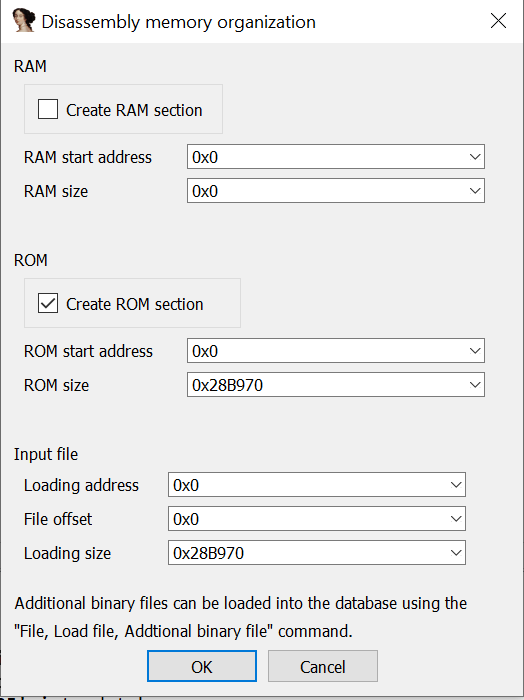
As I didn't have any, I accepted the default values and another warning was shown:
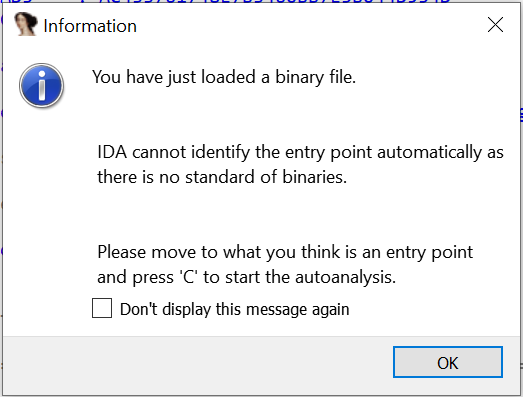
Basically, our entry point is missing and IDA don't know where to start loading the file. OK, no problem. Let's try to disassemble the first bytes:
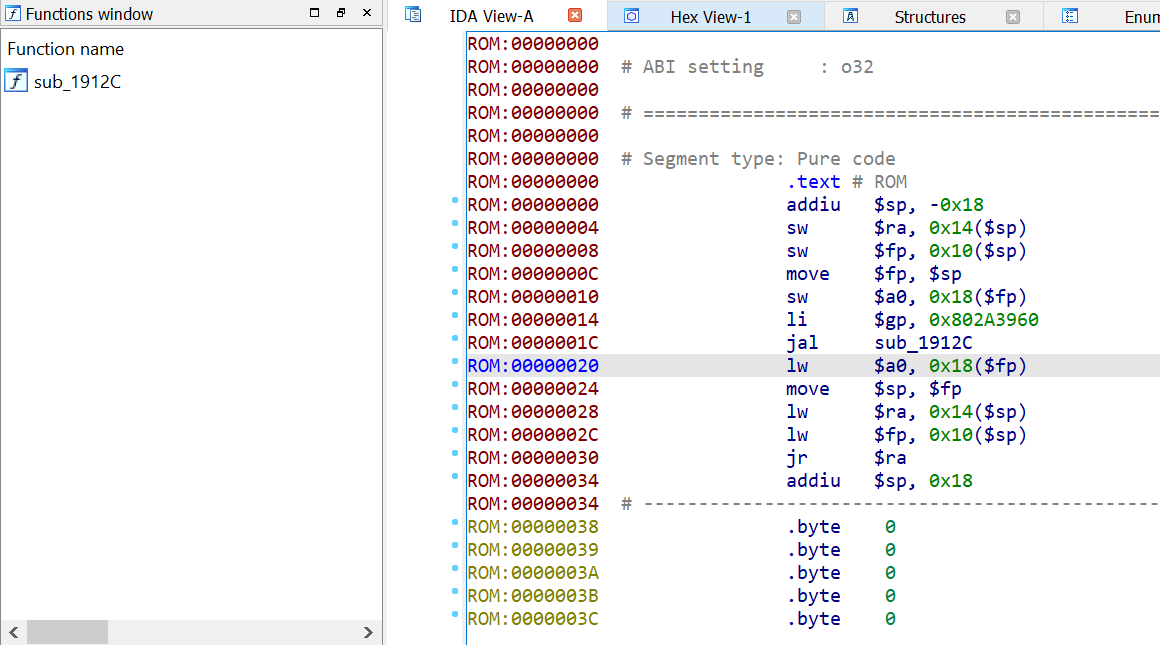
Great, IDA was able to identify one function and some code is shown in our disassembly window. However, it seems that it will be a hard work to reverse engineer the file with just that :P. Apparently, we have to dig deeper and find the entry point to load the file.
It's interesting to note one thing: the address 0x802A3960 is moved into the $gp register. This register is a global pointer that points into the middle of a 64K block of memory in the heap that holds constants and global variables. The mentioned address gave me an idea about the memory range I could look for.
So, I returned to the firmware analysis again, trying to find something that can help me to progress a little bit more, and I found two more interesting strings:
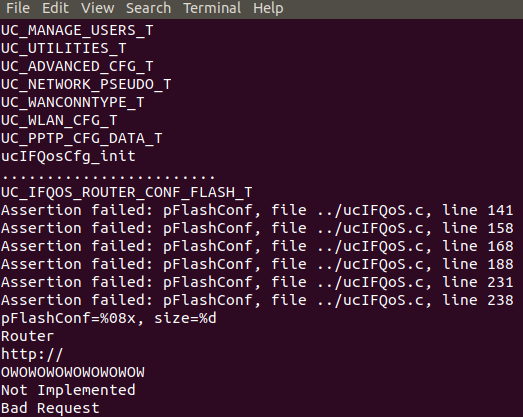
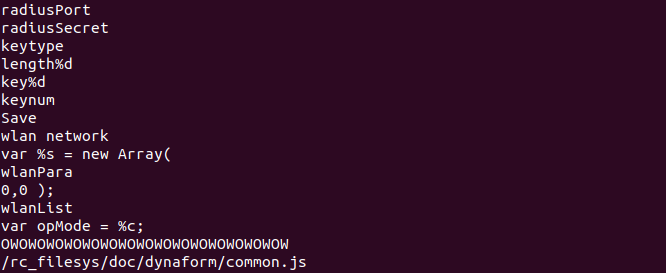
Both strings are "OWOW.." but with different lengths. The first occurence is 16 bytes long while the second one is 32 bytes long. My experience with file formats analysis was telling me that these strings could be a kind of magic bytes (bytes at some point in a file, mostly at the beginning of the file, that are used to identify the file format i.e: PE, GIF, PNG, etc). I googled a little bit and found a very good reference in the devttys0's blog that helped me a lot with the analysis. In the same blog post, there is another reference to a post from Ruben Santamarta from IOActive with some more details about these signature bytes.
The VxWorks MemFS file system
According to the previously mentioned posts, the OWOW.. string is used as a signature in the MemFS Wind River management file system. The string may be found twice in the firmware, according to IOactive's blog spot. I'll quote the paragraph:
the first one due to the .h where it is defined (close to other strings such as the webserver banner )and the second one already as part of the MemFS.
In the first place, devttys0 presented the following stucture for the header:
struct owfs_header
{
char magic[32]; // 'OWOWOWOWOWOW...'
uint32_t version; // version #1
uint32_t file_count;
uint32_t unknown; // ??
}
OWFS is how devttys0 named it on the post at first when nobody knew this file system was called MemFS.
In my case, this definition didn't match with what I had:
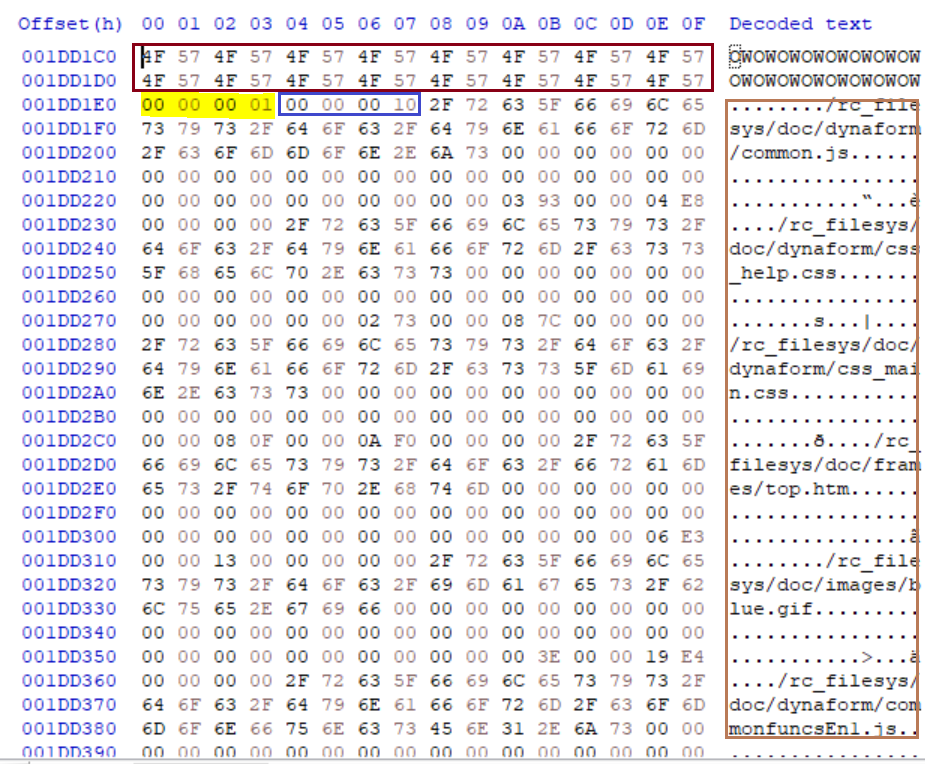
As you can see, I had only two DWORDS before the file entries. I went back to the other post and found that the third field can be optional. Then, the header in my case looked more like this:
struct owfs_header
{
char magic[32]; // 'OWOWOWOWOWOW...'
uint32_t version; // version #1
uint32_t file_count; // 16 files
array filenames_plus_eof[file_count];
}
The flag field mentioned in the IOActive's blog post doesn't make sense for my firmware file. The file list after the firmware signature contains 0x10 entries. Each entry has a maximum of 0x4C bytes in which 0x40 bytes are reserved for the filenames, 4 bytes for the file size, 4 bytes for the file offset (from the beginning of the file system header) and 4 bytes for an unknown field (null in all cases). The interesting thing is that all the files in the list are in plain, meaning that the flag field (1 in my case) doesn't represent the compressed/uncompressed option. It seems more like a version field or the values are used in the opposite way meaning 1 = plain, 2 = compressed.
In my case, the file entry header looks like this:
struct FILE_ENTRY_HEADER
{
char filename[0x40];
uint32_t file_size;
uint32_t file_offset;
uint32_t reserved; // always 0
}
It's almost the same definition as in the devttys0's post except for the last field always equal to null. It seems that the size of the header varies depending on the device/firmware.
With all this information, I was able to write a Python script to extract the files from the MemFS file system:
C:\Users\itsevart\Documents\reversing-tp-link-wr543g\code>python extract_files.py ..\bin\54B5 [+] Extracting files from ..\bin\54B5 [+] Searching signature.. [+] Signature found at offset: 1dd1c0 [+] SIGNATURE: OWOWOWOWOWOWOWOWOWOWOWOWOWOWOWOW [+] Flag: 0x00000001 [+] File count: 16 [+] Reading file entries.. >> Entry no 0 [+] filename: /rc_filesys/doc/dynaform/common.js [+] file size: 915 bytes [+] file offset: 0x000004e8 >> Entry no 1 [+] filename: /rc_filesys/doc/dynaform/css_help.css [+] file size: 627 bytes [+] file offset: 0x0000087c >> Entry no 2 [+] filename: /rc_filesys/doc/dynaform/css_main.css [+] file size: 2063 bytes [+] file offset: 0x00000af0 >> Entry no 3 [+] filename: /rc_filesys/doc/frames/top.htm [+] file size: 1763 bytes [+] file offset: 0x00001300 >> Entry no 4 [+] filename: /rc_filesys/doc/images/blue.gif [+] file size: 62 bytes [+] file offset: 0x000019e4 >> Entry no 5 [+] filename: /rc_filesys/doc/dynaform/commonfuncsEn1.js [+] file size: 3675 bytes [+] file offset: 0x00001a24 >> Entry no 6 [+] filename: /rc_filesys/doc/dynaform/commonfuncsEn3.js [+] file size: 3648 bytes [+] file offset: 0x00002880 >> Entry no 7 [+] filename: /rc_filesys/doc/images/helpPic.gif [+] file size: 5515 bytes [+] file offset: 0x000036c0 >> Entry no 8 [+] filename: /rc_filesys/doc/images/minus.gif [+] file size: 59 bytes [+] file offset: 0x00004c4c >> Entry no 9 [+] filename: /rc_filesys/doc/images/plus.gif [+] file size: 63 bytes [+] file offset: 0x00004c88 >> Entry no 10 [+] filename: /rc_filesys/doc/images/productphoto.gif [+] file size: 4634 bytes [+] file offset: 0x00004cc8 >> Entry no 11 [+] filename: /rc_filesys/doc/images/pw.gif [+] file size: 60 bytes [+] file offset: 0x00005ee4 >> Entry no 12 [+] filename: /rc_filesys/doc/images/top1_1.jpg [+] file size: 4076 bytes [+] file offset: 0x00005f20 >> Entry no 13 [+] filename: /rc_filesys/doc/images/top1_2.jpg [+] file size: 9790 bytes [+] file offset: 0x00006f0c >> Entry no 14 [+] filename: /rc_filesys/doc/images/top2.jpg [+] file size: 1221 bytes [+] file offset: 0x0000954c >> Entry no 15 [+] filename: /rc_filesys/doc/images/top_bg.jpg [+] file size: 289 bytes [+] file offset: 0x00009a14
Even though I was able to extract several files, 16 in total, I thought there were very few. In fact, remember that I showed a lot more references to .htm files. I started to search a little bit more and noted that there were lots of files scattered in the firmware data that didn't follow any structure and didn't contain any specific header so far. Some of these files contained a footer but no header. I started to look around the first signature occurrence and noted that there was a kind of table:
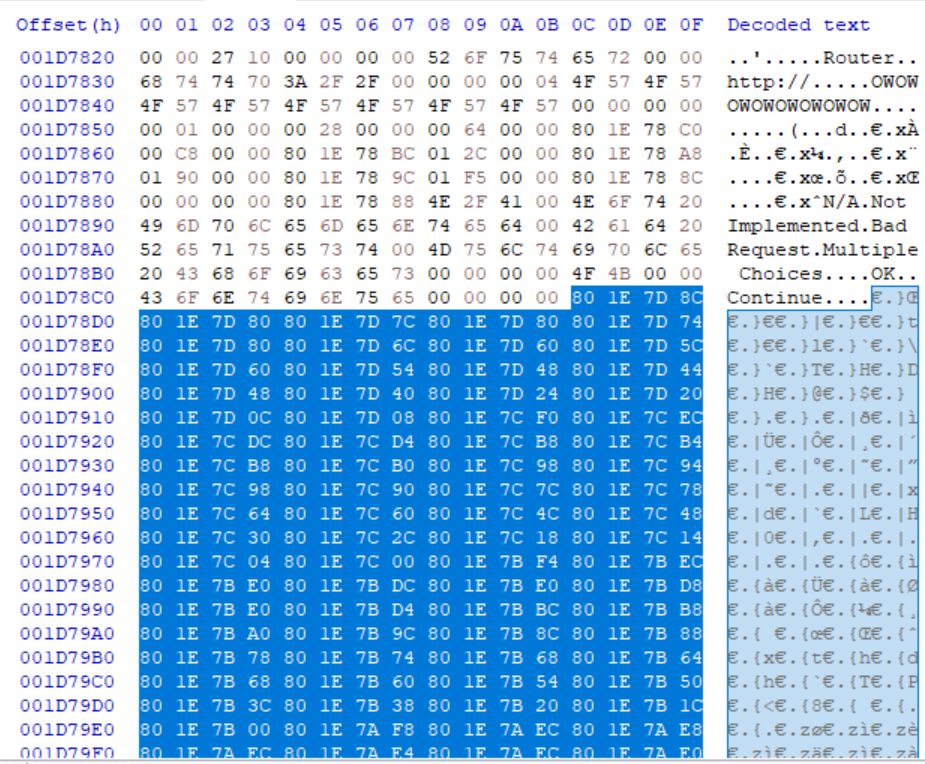
Unfortunately, I wasn't able to find a relation bewteen this table and the scattered files content.
Just a color note, I found that Firmware Mod Kit is using the same header struct for MemFS file systems mentioned on the IOActive's post and devttys0's post, however, that's not entirely my case.
Getting the binary being loaded by IDA
Once I extracted the files, I needed a way to continue with the analysis because the files I obtained weren't too interesting and I was sure that there were more inside. As I already mentioned, they weren't, probably, files with all their entire structure but parts of them handled by some respective service (HTTP, FTP, etc;), a kind of standalone server handling different types of protocols and sending chunks of files.
I needed a way to load the extracted data in IDA and get the all the functions, strings, symbols, etc; in order to do a more extensive analysis. The main goal I needed to accomplish was to find the base address to load the binary.
Again, I found two interesting and helpful blog posts.
In the post from the devttys0's blog, the author obtains the base address by analyzing an extracted MIPS binary with symbols extracted from the firmware in IDA. That binary is responsible for loading and decompressing a LZMA stream located at certain part of the firmware. The base address to load the decompressed stream is clearly referenced in the code. It's also mentioned that this address is used at some code found on the Internet:
So it appears that the LZMA data that we extracted earlier does contain executable code, and that it is decompressed and loaded into memory at address 0x80001000. A Google search for 'vxworks lzmadecode' turns up some source code that confirms this conclusion.
The referenced link doesn't work for me. I did a quick search again and found only one reference to a LZMA decoder using that address.
In the post from cq674350529's blog, the base address to load the binary is obtained from the output provided by Binwalk. A U-Boot header is found in the firmware file and contains a reference to an entry point address, that entry point address is the one used as base address in IDA.
In my case, both approaches didn't fit with my situation. I didn't have any U-Boot header or anything similar to that and I didn't have any other binary to analyze. My guess is that, in my case, the base address doesn't need to be inside the firmware data becase, probably, it's hardcoded in the bootloader. All the code needed to unpack the data is located on the device. What now? well, there is a coincidence in both post, the base address: 0x80001000. Let's try with that:
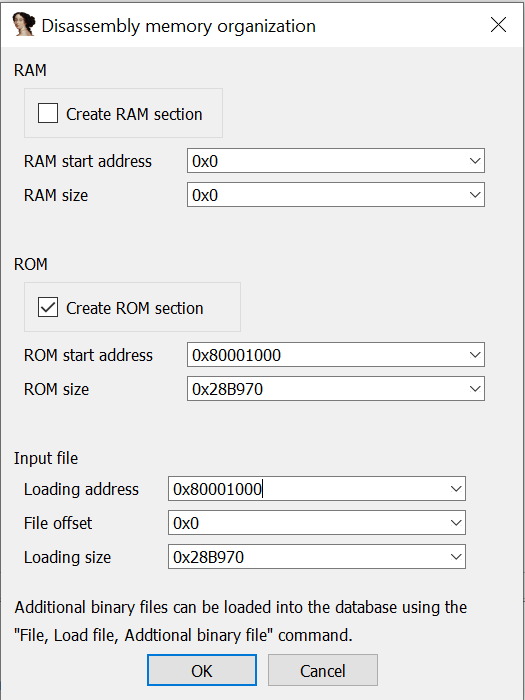
This was the result:
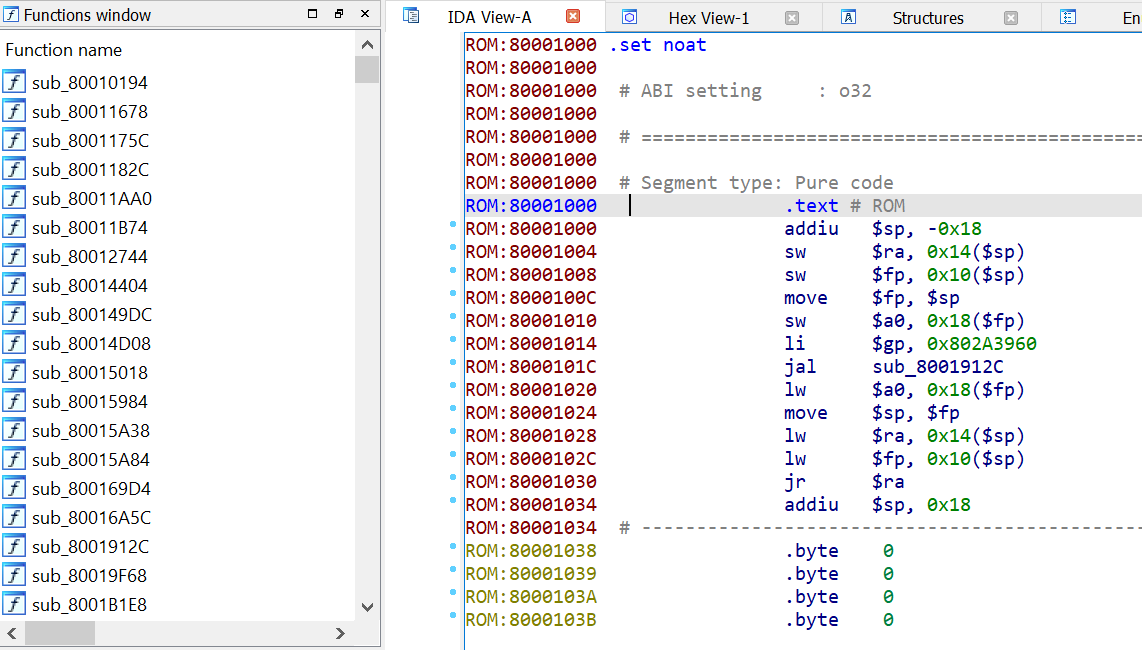
Bingo! After hitting C to create code in the disassembly window, IDA started to work with the auto-analysis and found a lot of functions. Several more than the one found when no base address was specified :P
Now, it can be seen that some of the strings that are part of chuncked files, are referenced in the code:
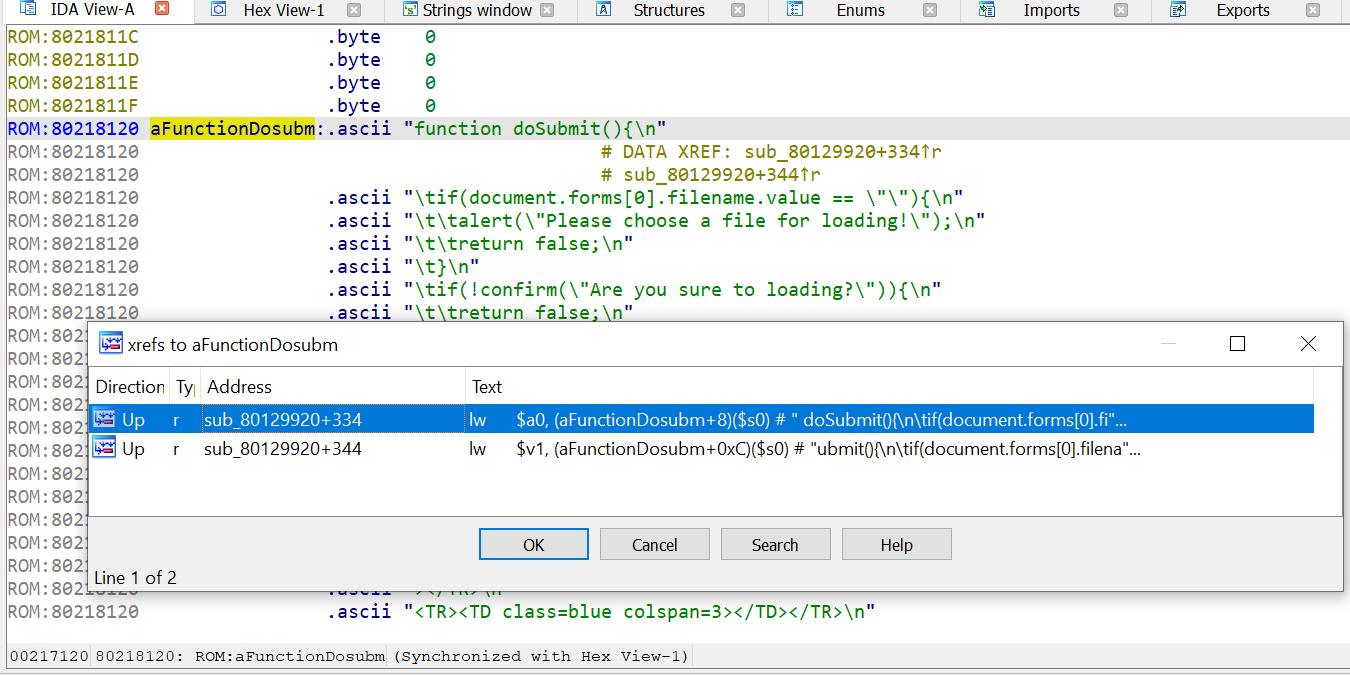
OK, I was able to reverse engineer the binary but, even though I had some string xrefs, there weren't any symbol. In the case of the cq674350529's blog post, the symbols were scattered in the firmware file and author needed to write a script in order to build the symbol table because IDA wasn't able to do it with the auto-analysis. However, in my case, I didn't have any known VxWorks symbol.
Anyway, by using the string xrefs and numeric constants it's possible to reverse engineer and rename functions. For example, I found the following string xref Error: MD4Update MD already done.. That string belongs to the Implementation of MD4 Message Digest Algorithm. It's possible to find some of the functions referenced in the source code by searching for the initialization constants:
#define I0 0x67452301 /* Initial values for MD buffer */ #define I1 0xefcdab89 #define I2 0x98badcfe #define I3 0x10325476 #define C2 013240474631 /* round 2 constant = sqrt(2) in octal */ #define C3 015666365641 /* round 3 constant = sqrt(3) in octal */
This is the corresponding code in the MIPS binary:
lui $a1, 0xEFCD lui $a2, 0x98BA lui $v0, 0x1032 ori $v1, 0x2301 li $a1, 0xEFCDAB89 --> this constant li $a2, 0x98BADCFE --> this one too li $v0, 0x10325476 sw $v0, 0xC($a0) sw $v1, 0($a0) sw $a1, 4($a0) sw $a2, 8($a0) sw $zero, 0x10($a0) jr $ra sw $zero, 0x14($a0)
That's the MD4Init() function.
Event though this is a good and common approach when reversing a binary without symbols, it takes a considerable time to have a decent list of reversed functions. Also, there are some common functions such as printf, memset, memcpy, etc... that can be easily identified but sometimes it depends on the compiler optimizations and flags used during the compilation process. So, I was sure there was an easier way to automate the work of identifying common functions and I was right :)
Getting symbols
In order to automate the task of identify common functions I used Rizzo, an IDA plugin developed by devttys0 that includes fuzzy signatures made with unique string references and other metrics as identifiable actions, such as memory accesses, references to constant values, and function calls. However, the plugin is a little bit outdated, the last change was 2 years ago in order to support IDA 7 and only supports Python 2. I reported an issue and @fuzzywalls (thanks btw) sent me his fork. However, that fork didn't work with the build of IDA 7.4 I had (191112).
After some work, I was finally able to fix all the issues and make it work with my IDA build and Python 2. These are the results:
Found 3 formal matches in 0.00 seconds. Found 107 fuzzy matches in 0.00 seconds. Found 188 string matches in 0.00 seconds. Found 40 immediate matches in 0.00 seconds. Renamed 162 functions in 0.54 seconds. Signatures applied in 24.04 seconds Caching 'Functions window'... ok Caching 'Names window'... ok
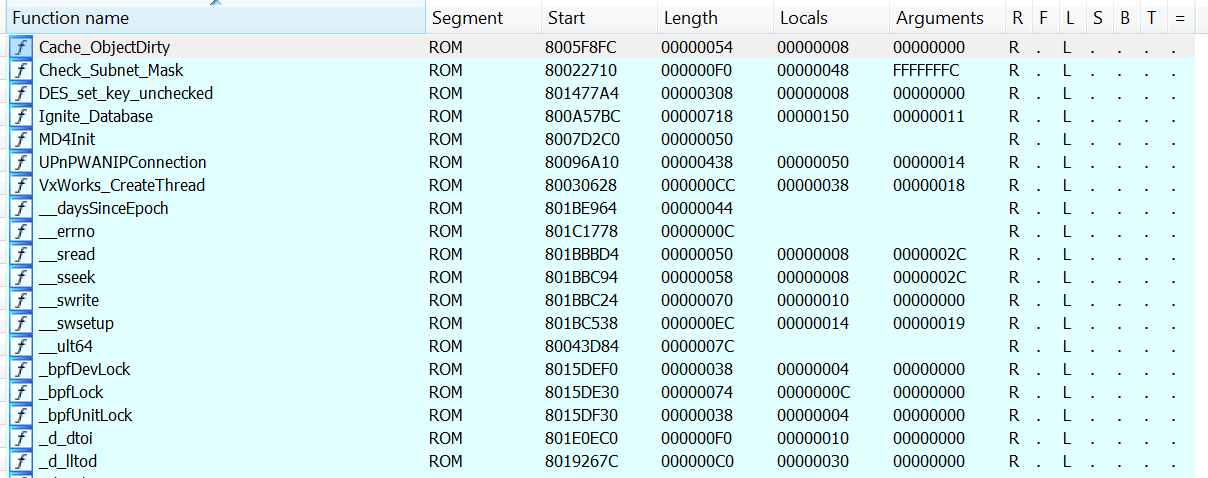
You can find my version of Rizzo here.
Last words
Once I got some symbols with Rizzo, I conducted a session to search for vulnerabilities but it wasn't successful :(
I started looking at the functions that Rizzo was able to recognize.
Some of the functions are related to DES and MD4 and weren't too interesting for me, these functions belong to some public implementation, for example: Implementation of MD4 Message Digest Algorithm. However, there are strings referencing functions that are, I guess, related to the configuration file (the configuration file can be dumped from the router's GUI, it's encrypted/obfuscated in some way):
ROM:801FA99C aApcfgencryptio:.ascii "apCfgEncryptionSet(%d, TRUE) failed\r\n"<0> ROM:801FA9C2 .byte 0 ROM:801FA9C3 .byte 0 ROM:801FA9C4 aIwirelessprivs:.ascii "iWirelessPrivSelect = %d, secSubType[1] = %d\r\n"<0> ROM:801FA9F3 .byte 0 ROM:801FA9F4 aApcfgauthtypes:.ascii "apCfgAuthTypeSet() failed\r\n"<0> ROM:801FAA10 aApcfgcipherset:.ascii "apCfgCipherSet() failed\r\n"<0> ROM:801FAA2A .byte 0 ROM:801FAA2B .byte 0 ROM:801FAA2C aApcfgkeysrcset:.ascii "apCfgKeySrcSet() failed\r\n"<0> ROM:801FAA46 .byte 0 ROM:801FAA47 .byte 0 ROM:801FAA48 aApcfggroupkeyu:.ascii "apCfgGroupKeyUpdateIntervalSet() failed\r\n"<0> ROM:801FAA72 .byte 0 ROM:801FAA73 .byte 0 ROM:801FAA74 aErrorUnableToG:.ascii "ERROR: Unable to generate key with given passphrase and ssid\n" ROM:801FAA74 .ascii <0> ROM:801FAAB2 .byte 0 ROM:801FAAB3 .byte 0 ROM:801FAAB4 aApcfgpassphras:.ascii "apCfgPassphraseSet() failed\r\n"<0> ROM:801FAAD2 .byte 0 ROM:801FAAD3 .byte 0 ROM:801FAAD4 aApcfgpassphras_0:.ascii "apCfgPassphraseKeySet() failed\r\n"<0>
Unfortunately, there aren't xrefs to these strings.
Some others like the following, took me to this source code (apparently, related to Ethernet and a kind of descriptors conversion between Atheros and VxWorks):
ROM:801FA5B8 aVxdesctomblkEr:.ascii "\n" ROM:801FA5B8 .ascii "vxDescToMblk: error in join mBlk\n"<0> ROM:801FA5DB .byte 0 ROM:801FA5DC aVxmblktodescMP:.ascii "vxMblkToDesc: M_PKTHDR not set on first mblk\n"<0>
Again, these strings don't have xrefs :(
The rest of the functions don't look so promising (as can be seen in this file), most of them are standard functions or auxiliary. There isn't any interesting function like a custom handler or something similar.
Another thing I tried was using the Burp Suite in order to intercept some of the requests from the HTTP server (the only service exposed by the device) and try to trigger a crash in some way, for example, modifying the parameters of the request. The following example is a capture from the NTP server configuration:
GET /userRpm/DateTimeCfgRpm.htm?timezone=540&month=1&day=1&year=2006&hour=11&minute=59&second=52&ntpA=0.0.0.0&ntpB=0.0.0.0&Submit=Save HTTP/1.1 Host: 192.168.1.1 User-Agent: Mozilla/5.0 (X11; Ubuntu; Linux x86_64; rv:61.0) Gecko/20100101 Firefox/61.0 Accept: text/html,application/xhtml+xml,application/xml;q=0.9,*/*;q=0.8 Accept-Language: en-GB,en;q=0.5 Accept-Encoding: gzip, deflate Referer: http://192.168.1.1/userRpm/DateTimeCfgRpm.htm Authorization: Basic bnJpdmE6SncyWGtEYWpWbG1jaA== Connection: close Upgrade-Insecure-Requests: 1
In order to get some output, I connected a serial device interface on the other side in order to catch for possible outputs, however, Windows 10 was giving me some troubles with the USB interface. I got some errors related to max voltage consumption and had to restart the PC several times in order to continue.
At the end, by doing some test and looking at the code in the binary, it seems that everything is handeld there (in a single binary) and most answers are harcoded. The server responds with hardcoded "chunks" of data and any other request that doesn't fit with the answer, is dropped. Different requests (with different parameters) return the same answer, for example, when changing the NTP server.
What else can be done?
Well, probably a debugger inside the device would have been very helpful. A possibility to accomplish this task would have been to modify the firmware and upload a custom GDB server. However, it would have required to compile GDB server for MIPS using the compilation tools for VxWorks (apparently, it's only targeting x86/x64/ARM and VxWorks 7). If someone feels like trying, please, I'd be really glad to hear from them!.
Conclusion
Certainly, to reverse engineer an unknown architecture or deal with an uncommon OS has its complications but sometimes, even with few information available, it's possible to make some progress and finish the work. In this particular case, it was possible thanks to some guys who found similar issues in the past and documented the process.
Thanks to that, I was able to reverse engineer the unknown file system used in the router and to get familiar with the operating system. It would have been nice to find a vulnerability but I wasn't lucky at this time. Begin able to gain access to a shell or to upload tools to the router in order to debug it, would really be a big step towards assessing its security and hunting for its vulnerabilities, and will require some more work!
Anyway, I hope that sharing this experience will in turn prove useful to others.
Acknowledgements
Thanks to all my Quarkslab colleagues who proofread this article and provided valuable feedback.
Thanks to Craig Heffner (devttys0) for his amazing posts, tools and continuous work on embedded devices.
Thanks to Evan Walls (fuzzywalls) for helping me with his Rizzo fork. I just fixed what was needed to make it work instead of porting the entire plugin to the new IDA 7.4 API.